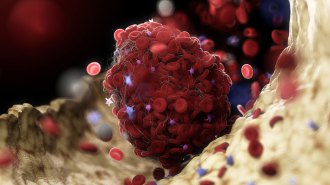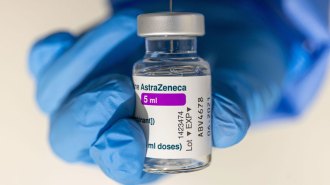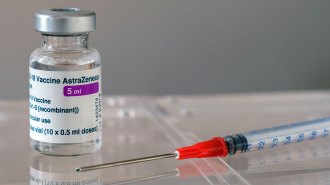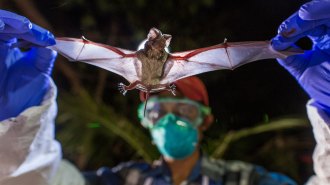
Erin Garcia de Jesús is a staff writer at Science News. She holds a Ph.D. in microbiology from the University of Washington, where she studied virus/host co-evolution. After deciding science as a whole was too fascinating to spend a career studying one topic, she went on to earn a master’s in science communication from the University of California, Santa Cruz. Her writing has appeared in Nature News, Science, Eos, Smithsonian Voices and more, and she was the winter 2019 science writing intern at Science News.

Trustworthy journalism comes at a price.
Scientists and journalists share a core belief in questioning, observing and verifying to reach the truth. Science News reports on crucial research and discovery across science disciplines. We need your financial support to make it happen – every contribution makes a difference.
All Stories by Erin Garcia de Jesús
-
 Health & Medicine
Health & MedicinePeople with rare blood clots after a COVID-19 jab share an uncommon immune response
AstraZeneca’s and J&J’s shots are linked to antibodies that spark clots. Knowing that lets doctors ID cases and get patients the right treatment.
-
 Health & Medicine
Health & MedicineU.S. pauses J&J vaccine rollout after 6 people of 6.8 million get rare blood clots
The COVID-19 vaccine’s pause is out of abundance of caution, experts say. The potentially deadly clots appear to be “extremely rare.”
-
 Health & Medicine
Health & MedicineAstraZeneca’s COVID-19 vaccine is tied to uncommon blood clots in rare cases
Blood clots should be listed as a possible side effect of AstraZeneca’s vaccine, but its benefits still outweigh the risks, experts say.
-
 Health & Medicine
Health & Medicine4 takeaways from the WHO’s report on the origins of the coronavirus
The leading hypothesis is that the coronavirus spread to people from bats via a yet-to-be-identified animal, but no animals have tested positive so far.
-
 Health & Medicine
Health & MedicinePfizer says its COVID-19 vaccine has 100 percent efficacy in young people
Vaccinated 12- to 15-year-olds developed higher levels of coronavirus antibodies compared with vaccinated 16- to 25-year-olds from a previous trial.
-
 Animals
AnimalsA gene defect may make rabbits do handstands instead of hop
Mutations in a gene typically found throughout the nervous system rob rabbits of their ability to hop. Instead, the animals walk on their front paws.
-
 Health & Medicine
Health & MedicineAstraZeneca’s COVID-19 vaccine holds up in an updated analysis of trial data
The redo dropped the overall efficacy of AstraZeneca’s vaccine from 79 percent to 76 percent. But a slight fluctuation is not unexpected, experts say.
-
 Health & Medicine
Health & MedicineAstraZeneca says its COVID-19 vaccine is 79 percent effective in a U.S. trial
The shot was 80 percent effective at preventing illness in people 65 and older and prevented severe disease and hospitalization.
-
 Health & Medicine
Health & MedicineAstraZeneca’s COVID-19 vaccine isn’t tied to blood clots, experts say
Multiple countries suspended use of AstraZeneca’s COVID-19 vaccine because of concerns about blood clots, but health authorities say the shot is safe.
-
 Health & Medicine
Health & MedicineWe still don’t know for sure where the coronavirus came from. Here’s why
A year into the pandemic, we know the virus probably came from bats, but how and why it leaped to humans are still unknown.
-
 Health & Medicine
Health & MedicineCoronavirus reinfections appear rare, especially in people younger than 65
Previous infections provide 80 percent protection in younger people and 47 percent in those over 65. Vaccines might help boost immunity further.
-
 Health & Medicine
Health & Medicine50 years ago, researchers treated chronic pain with electricity
In 1971, doctors eased chronic pain by sending electrical impulses to the spinal cord. Fifty years later, improved techniques help paralyzed people walk.